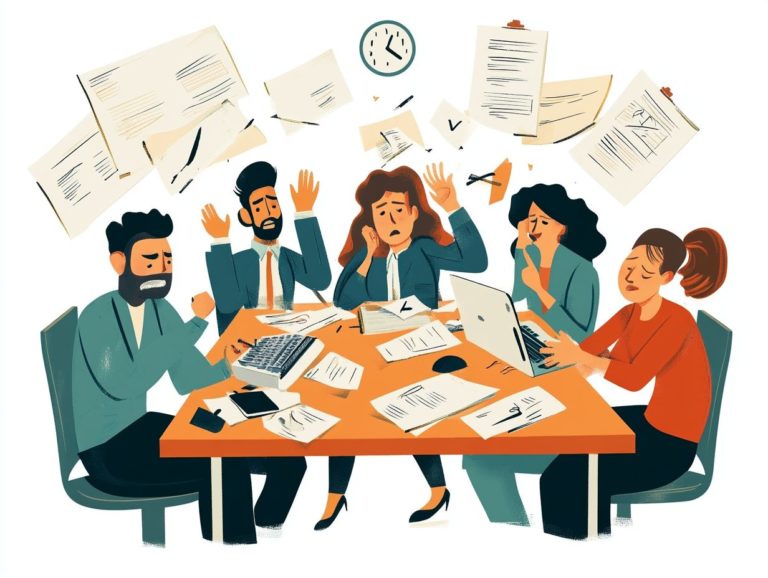Building Your Negotiation Toolkit: Essential Skills
Get ready to discover essential skills that can supercharge your negotiation toolkit! Whether you re finalizing a business deal, handling disagreements, or haggling at a bustling market, grasping the nuances of negotiation can pave the way for more favorable outcomes.
Immerse yourself in practical tips and techniques designed to empower you to negotiate with confidence in any setting, fostering win-win solutions as you go.
Contents
- Key Takeaways:
- 1. Understanding the Basics of Negotiation
- 2. Active Listening and Communication Skills
- 3. Knowing Your Goals and Priorities
- 4. Research and Preparation
- 5. Creative Problem-Solving
- 6. Building Rapport and Trust
- 7. Managing Emotions
- 8. Using Persuasion and Influence
- 9. Setting and Maintaining Boundaries
- 10. Finding Mutually Beneficial Solutions
- 11. Handling Difficult Situations and People
- 12. Negotiating in Different Cultures
- 13. Developing a Win-Win Mindset
- 14. Practice and Continuous Improvement
- 15. Applying Negotiation Skills in Different Settings
- What Are the Most Common Negotiation Mistakes to Avoid?
- Frequently Asked Questions
- What Are the Essential Skills for Building a Negotiation Toolkit?
- How Can Communication Help in Negotiation?
- Why Is Active Listening Important in Negotiation?
- How Does Problem-Solving Contribute to Successful Negotiation?
- What Role Does Emotional Intelligence Play in Negotiation?
- Why is Adaptability an Essential Skill for Negotiation?
Key Takeaways:

Understanding the basics of negotiation is crucial for building a strong negotiation toolkit.
Active listening and effective communication skills are essential in any negotiation. Knowing your goals and priorities and conducting thorough research and preparation are key to successful negotiations.
1. Understanding the Basics of Negotiation
Understanding the basics of negotiation is essential for your success in consulting and building fruitful client relationships. This foundational knowledge will arm you with negotiation skills. These skills can significantly influence project terms and stakeholder engagement.
You ll delve into critical elements such as negotiation strategies, identifying common ground, and appreciating the role of emotional intelligence in navigating complex discussions. Effective negotiation is not a one-size-fits-all process; it requires an in-depth grasp of your client s needs, allowing you to tailor your approach for optimal outcomes.
Influential figures like Kelsey Miller stress the value of active listening in negotiations, ensuring that every party feels valued and understood. In the same vein, Roger Fisher s principled negotiation approach encourages you to focus on interests rather than positions, fostering collaboration and mutual benefit.
By employing techniques such as establishing rapport and seeking win-win scenarios, you can craft agreements that satisfy all stakeholders, paving the way for long-term partnerships and project success.
2. Active Listening and Communication Skills
Active listening and effective communication are essential skills for successful negotiation. They enable you to build rapport and grasp the underlying interests of everyone involved.
By using techniques like summarizing what the other party has said, asking open-ended questions, and providing non-verbal cues such as nodding, you can show genuine engagement and empathy.
The impact of emotional intelligence is significant; those who articulate their feelings and recognize the emotions of others tend to navigate negotiations more smoothly.
For instance, when you, as a seller, detect a buyer s hesitation, addressing those concerns with a blend of understanding and clarity can lead to a more advantageous agreement. Refining these skills boosts your chances of achieving mutually beneficial outcomes.
3. Knowing Your Goals and Priorities
Understanding your goals and priorities is essential in negotiation. This awareness allows you to articulate your needs clearly while also grasping the interests of your clients and other stakeholders.
Clarity in this context streamlines communication and aids in crafting strategies that align with the objectives of both parties. By setting specific and measurable goals, you create a roadmap that guides the negotiation process and minimizes the chances of misunderstandings.
This approach cultivates an environment where interests can be openly discussed, helping to identify common ground. Techniques like interest mapping and prioritization are invaluable for revealing the underlying desires of both sides, while also evaluating your Best Alternatives to a Negotiated Agreement (BATNA) your best option if you cannot reach an agreement.
Employing this strategic mindset gives you the power to make informed decisions, significantly enhancing the likelihood of achieving a mutually beneficial outcome.
4. Research and Preparation
Research and preparation are pivotal steps in your negotiation process. They require thorough market research and data analysis to inform your strategies and anticipate stakeholder preferences.
These foundational elements give you a deeper understanding of the landscape in which you operate, including current trends and potential obstacles. Conducting a competitor analysis provides you with a comprehensive view of what others in your field are doing, offering valuable insights that can shape your approach.
A detailed negotiation checklist ensures you cover all key points and objectives, minimizing the risk of overlooking critical issues. By investing time in these preparatory activities, you can engage with greater confidence, leading to conversations that are not only more effective but also aligned with your overarching goals.
5. Creative Problem-Solving
Creative problem-solving is vital in negotiation. It creates new solutions that benefit everyone involved and helps reach successful agreements.
By employing techniques like brainstorming, role reversal, and hypotheticals, you can significantly enhance your negotiation process. These methods enable you to explore various perspectives and generate diverse ideas, ultimately unveiling options you may not have initially considered.
Staying flexible is essential; it helps you adjust your strategies based on new information and shifting dynamics. Emphasizing collaboration over competition fosters a deeper understanding of each party’s interests, creating pathways to solutions that address immediate needs and nurture enduring partnerships.
6. Building Rapport and Trust
Building rapport and trust is essential in negotiation. It fosters open communication and strengthens relationships between parties, leading to more favorable negotiation dynamics.
By leveraging emotional intelligence, the ability to understand your own feelings and those of others, you can attune yourself to the concerns of the other party, creating a more understanding atmosphere. For instance, in a high-stakes business deal, if you acknowledge the concerns of the other party and demonstrate empathy, you can significantly enhance cooperative dialogue.
When trust is established, parties are more inclined to share their genuine interests and concerns. This transparency not only smooths out the negotiation process but also paves the way for mutually beneficial outcomes just look at successful partnerships that start with open discussions about shared goals.
7. Managing Emotions

Effectively managing your emotions is crucial in the negotiation process. It influences your decision-making and shapes discussions, giving you the power to maintain control and focus on what truly matters.
To achieve this, consider using the emotional thermostat. This means being aware of your feelings and adjusting them to stay calm. This awareness helps you regulate your responses and fosters a more favorable atmosphere for dialogue.
Applying emotional intelligence is equally important; it allows you to empathize with your counterparts and grasp their underlying motivations.
When you harness these tools, you significantly enhance your chances of reaching mutually beneficial agreements, improving the outcomes of your negotiations.
8. Using Persuasion and Influence
Harnessing the power of persuasion and influence is essential for anyone looking to negotiate effectively. These skills enable you to advocate for your position while also grasping and addressing the concerns of others.
By mastering a variety of persuasion techniques, you can craft compelling arguments and foster rapport with stakeholders, paving the way for more productive dialogue.
Techniques like active listening, mirroring, and employing vivid storytelling can subtly guide discussions toward outcomes that benefit everyone involved.
Always remember, ethical considerations are vital this isn’t just about winning but building lasting relationships. Successful negotiation is about striking a balance between assertiveness and empathy, ensuring that while positions may differ, the relationships remain intact.
9. Setting and Maintaining Boundaries
Setting boundaries is essential! It creates a strong foundation that helps you navigate challenges confidently during negotiations. This keeps discussions productive and focused on resolving issues without spiraling into conflict.
These boundaries not only give you the power to articulate your needs clearly but also create a respectful atmosphere where everyone feels heard. When you establish clear limits, it becomes much easier to spot negotiation missteps, like crossing personal or professional lines that could derail progress.
By understanding and adhering to these boundaries, you cultivate a culture of collaboration, minimize misunderstandings, and lay the groundwork for effective conflict resolution.
Ultimately, the diligent practice of setting boundaries serves as the bedrock for constructive dialogue.
10. Finding Mutually Beneficial Solutions
Your ultimate goal in negotiation is to find mutually beneficial solutions, as this leads to value creation and strengthens relationships with all stakeholders involved.
Cultivating an environment that encourages open dialogue and genuine collaboration allows you to explore diverse perspectives and uncover shared interests.
Emphasizing creative problem-solving gives you the power to move beyond traditional bargaining tactics. Actively seek options that enhance collective outcomes. This collaborative approach fosters trust and encourages everyone to express their needs and concerns freely.
Engaging in thoughtful exchanges can help you unearth innovative solutions that satisfy both your objectives and those of your negotiating partners. This results in stronger, more productive partnerships.
11. Handling Difficult Situations and People
Handling difficult situations and challenging people is a common hurdle in negotiation. It requires a thoughtful approach to navigate conflicts and achieve productive outcomes.
To address these challenges effectively, employ various techniques tailored to the specific dynamics at play. Truly paying attention to what others are saying is crucial; it enables you to understand their needs and concerns, allowing for a more empathetic response.
By remaining calm and composed, you maintain a professional demeanor, setting the stage for constructive dialogue. Establishing common ground and focusing on shared goals can further facilitate conflict resolution.
Using these strategies helps you manage tensions and cultivate healthier relationships, leading to more favorable resolutions in the long run.
12. Negotiating in Different Cultures
Negotiating across different cultures demands a keen awareness of cultural nuances and effective tactics that honor diverse communication styles. This understanding is crucial, as misunderstandings can easily stem from differing expectations.
For example, what you may see as a straightforward approach in one culture could be viewed as overly aggressive in another. In many Asian cultures, people prefer to communicate indirectly, requiring you to read between the lines to uncover underlying intentions. In contrast, Western cultures often prize directness, valuing clear and forthright dialogue.
Fostering cultural awareness helps bridge these gaps, build trust, and facilitate smoother interactions. This ultimately paves the way for more favorable agreements for everyone involved.
13. Developing a Win-Win Mindset
Developing a win-win mindset is crucial for successful negotiations. It cultivates collaboration, sparks creative solutions, and enhances value for everyone involved.
This approach shifts your focus from simply competing for the best deal to actively pursuing mutual benefits. By diving into the underlying interests and values of each participant, you can uncover common ground and craft innovative options that meet everyone’s needs.
Practicing empathy and maintaining open communication lays the foundation for trust, making it easier to navigate any conflicts that arise.
Embracing this mindset leads to immediate positive outcomes and fosters long-term relationships, ensuring that future negotiations flow more smoothly and productively.
Start practicing these strategies today to improve your negotiation skills and build better relationships!
14. Practice and Continuous Improvement

Practicing and continuous improvement sharpen your negotiation skills. Regular training and real-world experience enhance your effectiveness.
By immersing yourself in ongoing negotiation training and practical simulations, you ll refine your techniques and adapt to different contexts with ease. This repeated exposure to diverse situations builds your confidence and provides a safe space to test new strategies.
As you actively practice these skills, you ll become more proficient at identifying key issues, clearly communicating your needs, and finding common ground with your counterparts.
Your dedication to development leads to better outcomes, fostering stronger relationships and paving the way for mutually beneficial agreements.
15. Applying Negotiation Skills in Different Settings
Your negotiation skills apply to various settings. These include business, personal conflicts, and international diplomacy. This demands a level of adaptability and a keen awareness of what different people want.
Beyond simply exchanging terms, you must evaluate the unique characteristics of each context. For instance, in a corporate environment, your strategies might lean toward assertiveness to maximize profit.
In contrast, personal disputes often require a touch of empathy and active listening, which means truly paying attention to what the other person is saying. When navigating the world of diplomacy, patience and cultural awareness become essential for successful treaty formation.
By tailoring your approach to meet diverse objectives, you enhance outcomes and strengthen relationships, ensuring that everyone involved feels valued and understood throughout the negotiation process.
What Are the Most Common Negotiation Mistakes to Avoid?
Avoiding common negotiation mistakes is essential for you to become an effective negotiator. Recognizing common missteps is crucial as they can undermine relationships and lead to outcomes that fall short of your goals.
Often, negotiators rush in unprepared, leading to a lack of clarity and miscommunication that erodes trust between parties. If you adopt a confrontational attitude instead of a collaborative approach, you risk alienating clients and missing out on future partnership opportunities.
Invest time in research NOW to avoid pitfalls. Actively listening to the other party’s needs and maintaining an open mindset can transform your negotiation experience. These strategies enhance the immediate outcome and contribute to lasting client relationships, setting you up for long-term success.
How Can Emotional Intelligence Help in Negotiations?
Emotional intelligence is essential in negotiations, as it gives you the power to understand and manage both your emotions and those of others, which paves the way for effective communication and conflict resolution.
By honing this skill, you can become more attuned to the nuances of non-verbal cues and the deeper feelings that drive conversations. For instance, when you detect frustration in your counterpart, leveraging empathy can transform a potentially heated exchange into a more collaborative dialogue.
Effectively managing your own stress during high-stakes negotiations fosters clearer thinking and enhances your decision-making abilities. By honing your emotional intelligence, you not only get better results today but also build lasting relationships for tomorrow!
What Are the Different Types of Negotiation?
Understanding the various types of negotiation is crucial for crafting effective strategies tailored to your context and objectives.
By distinguishing between distributive and integrative negotiation, you can refine your approach to secure more favorable outcomes.
Distributive negotiation, often seen as a win-lose situation, focuses on dividing a fixed pool of resources like salary negotiations or competitive bidding.
In contrast, integrative negotiation is a type where both parties work together to find solutions that satisfy everyone. This approach is especially beneficial in long-term partnerships, where both parties aim for mutually beneficial results.
By becoming familiar with these negotiation types, you enhance your skills and nurture better relationships, paving the way for more sustainable agreements.
How Can One Negotiate Effectively in a Team?
Negotiating effectively in a team setting requires collaboration, clear communication, and a cohesive approach to stakeholder preferences and negotiation tactics.
Your team should articulate specific objectives and assign defined roles based on individual strengths and expertise. Each member must understand their responsibilities, fostering accountability and keeping everyone focused on their tasks.
Regular check-ins help maintain alignment and promptly address any emerging issues. Open dialogue cultivates trust, allowing team members to share insights and strategies freely.
By cultivating these practices, your team can enhance cohesiveness, making negotiations more productive and attuned to everyone’s needs.
What Are the Ethical Considerations in Negotiation?
Ethical considerations are essential in the negotiation process, guiding decisions that uphold integrity and foster positive dynamics.
When you prioritize honesty and transparency, you create an atmosphere of trust that enhances communication. This trust streamlines the negotiation and opens doors to amazing opportunities that might remain hidden in less ethical contexts.
Sticking to ethical guidelines bolsters your reputation, creating opportunities that extend well beyond the immediate negotiation. Embracing ethical principles allows you to build lasting partnerships, as mutual respect nurtures an environment ripe for future collaboration.
Frequently Asked Questions

What Are the Essential Skills for Building a Negotiation Toolkit?
The key skills for building a negotiation toolkit are communication, active listening, problem-solving, critical thinking, emotional intelligence, and adaptability. Developing effective communication skills for negotiators helps you understand, analyze, and navigate a negotiation situation effectively.
How Can Communication Help in Negotiation?
Effective communication is crucial in negotiation. It helps you clearly convey your message, understand the other party’s perspective, and bridge gaps in understanding. Additionally, it builds rapport and establishes a collaborative environment.
Why Is Active Listening Important in Negotiation?
Active listening is vital in negotiation as it allows you to understand the other party’s needs, interests, and concerns. It also helps identify underlying emotions and unspoken cues, which can be crucial for reaching a mutually beneficial agreement.
How Does Problem-Solving Contribute to Successful Negotiation?
Negotiation often involves finding solutions to problems or conflicts. Strong problem-solving skills enable you to analyze situations, identify potential solutions, and find win-win outcomes. They also help generate creative and innovative solutions to complex issues.
What Role Does Emotional Intelligence Play in Negotiation?
Emotional intelligence refers to the ability to understand and manage one’s emotions and those of others. In negotiation, it helps maintain composure, manage conflicts, and build relationships, leading to successful outcomes.
Why is Adaptability an Essential Skill for Negotiation?
Negotiations often face unexpected twists. Adaptability helps you quickly change your approach to tackle these challenges.
This flexibility boosts your chances of securing a favorable deal.






